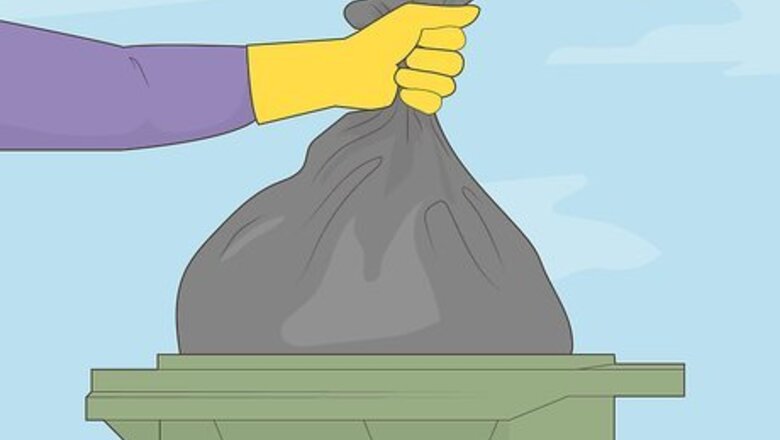
views
Take out the trash as soon as it's full or smelly.
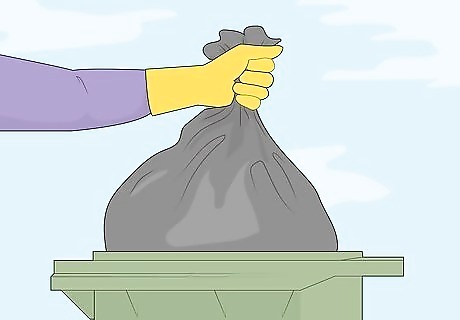
Putting the trash out keeps your kitchen fresh and prevents bacterial growth. If you don't typically take out the trash until it's full, you might not realize how smelly it's making your kitchen, especially if there's no lid on top. Start taking out the trash at the end of each day so your kitchen smells great and food in the trash can doesn't begin to rot, which can grow maggots and fruit flies. Don't forget to clean your trashcan—take the empty can outside and spray it with a disinfecting spray. Then, pop on a pair of gloves and scrub the inside and outside before you rinse it off.
Wipe up spills immediately.
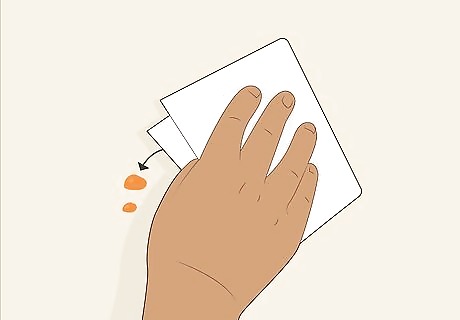
Use a cloth to clean up spills before they stain or cause a sticky mess. Keep paper towels on the counter or cloths in a drawer so you can quickly grab one if there's a spill. Wipe up the bulk of the mess with a paper towel. Then, dip a cloth in hot soapy water and wipe it over the counter so it's not sticky or greasy. Getting rid of messes right away stops them from hardening or becoming stickier. This can prevent pests like flies from gathering in your kitchen.
Clean up after each meal.
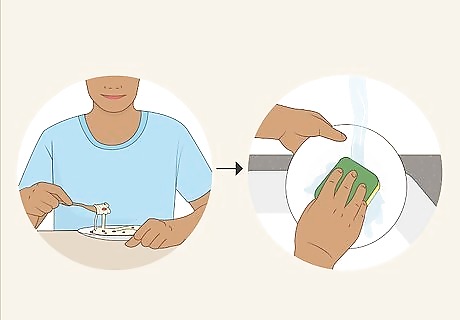
You won't have to spend as much time and your kitchen will stay cleaner. If you're like most people, doing the dishes is a chore. However, if you let dirty dishes pile up, you'll have to work hard to clean them and you won't have clean working space in your kitchen. Get in the habit of clearing the table, washing the dishes, and wiping the counters after every meal. If you live with other people, ask them to help out, especially if you're the one making the meals. You might ask your kids to load the dishwasher after dinner or get your roommate to take out the trash, for instance. Do you have a dishwasher? Get into a routine of loading and running it every day. Try to unload it as soon as the dishes are cool enough to handle. This way, it's empty when you put away dirty dishes.
Clear the counters and wipe them clean.
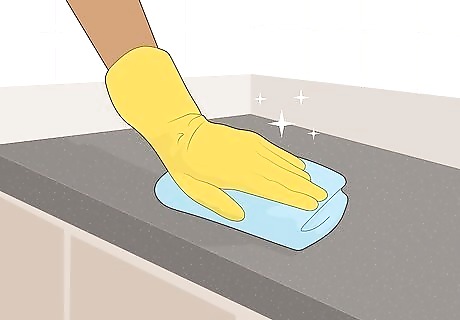
Messy counters take up workspace and can be hazardous. If you stack dishes, pots, or knives, you're losing out on valuable space in your kitchen and these could topple over and cause accidents. Clear off your countertops as you cook. Then, wipe the surfaces with a cloth soaked in hot soapy water or a multi-purpose kitchen cleaner that contains bleach. If you hate wiping up crumbs with a wet cloth, get a small brush and dustpan or use a small vacuum. This can be useful cleaning up around a toaster. Try to store large items or appliances you use in cabinets or your pantry so they're not taking up space on your counters.
Scrub your sink every day.
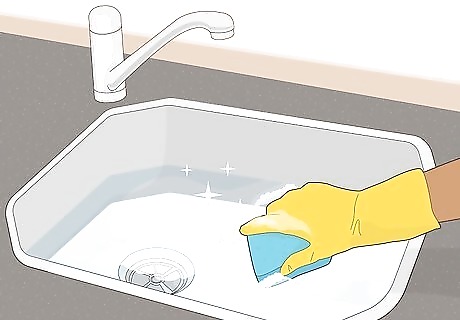
Wash the inside of your sink and faucet every day to remove bacteria. A typical kitchen sink has more bacteria than a trash can! To clean your sink, wash the faucet and sink with hot, soapy water. To deep-clean it, wipe the surface with a diluted bleach mixture. You may want to do this once a week to keep your kitchen sanitized, especially if you cook a lot. To make a diluted bleach solution, mix 1 tablespoon (15 ml) of bleach with 4 cups (0.95 L) of water. If you've got a garbage disposal, clean it once a week. Turn off the disposal and put 6 ice cubes into it along with 1 tablespoon (14 g) of baking soda, 3 thin slices of lemon, and 1 teaspoon (4.9 ml) of bleach. Add 6 more ice cubes and turn on the disposal without running any water. Once the grinding stops, keep the disposal running and turn on the water for 30 seconds.
Replace or clean your sponge often.
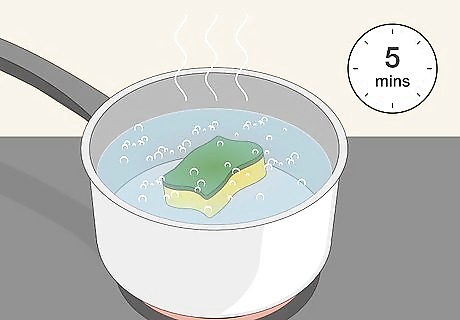
Grab a new cloth or boil your sponge for 5 minutes to kill bacteria. Unfortunately, that kitchen cloth or sponge that you reach for throughout the day grows bacteria really easily. If possible, use a new cloth every day or boil your sponge in a pot of water for 5 minutes to kill bacteria. You can a put wet sponge into the microwave and heat it on high for 1 minute to sanitize it, but your sponge may burn if your microwave is really powerful.
Prevent cross-contamination from cutting boards.
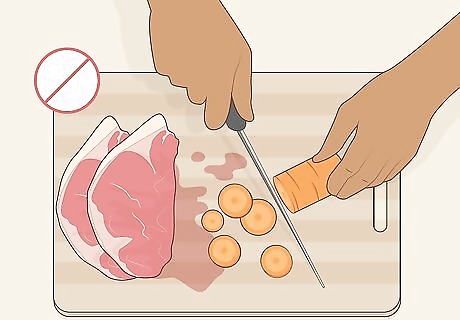
Use separate boards for meat and wash your hands so you don't spread germs. Cross-contamination is the transfer of germs or bacteria from food or a surface. In your kitchen, you might accidentally spread germs from raw meat to vegetables, for instance, if you use the same cutting board without washing it. To keep your kitchen safe, designate a separate cutting board for meat or seafood and always wash your hands, knife, and the cutting board after handling raw meat. Replace your cutting boards when you notice deep grooves that are hard to clean.
Sweep your floors daily and mop once a week.
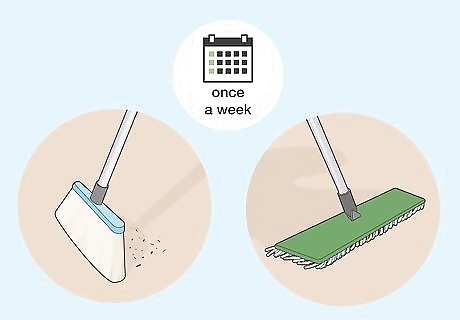
Keep dust, crumbs, and dirt out of your kitchen. If you've got messy eaters in your home, you may want to sweep after each meal. Then, once a week, fill your sink or a bucket with hot soapy water or a floor-cleaning solution. Dip your mop into it and squeeze out the excess before you scrub the floor with it. There are tons of great spot-mop products available at most hardware or home goods stores. Many of these use a pre-moistened cleaning cloth that you attach to a mop-like tool before you wipe it over the spot on your floor. Let the floor air dry completely before you walk on it or you may slip or leave footmarks.
Clean out your fridge and freezer.
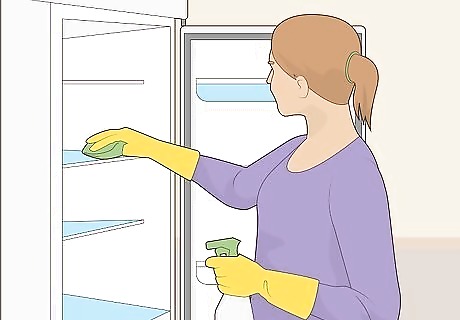
Toss old food and clean shelves to sanitize the fridge. Your fridge is the workhorse of the kitchen, so give it the attention it deserves. Remove all of the food and check for moldy, expired food. Throw out the rotten food and wipe down all of the shelves with hot soapy water before you put food back in. Do the same for your freezer. Place an open box of baking soda into your fridge for a cheap way to deodorize it. Keeping a clean fridge can help your food stay fresher for longer. Put a little thermometer into the fridge so you can monitor the fridge temperature—it should be at 40 °F (4 °C) or below and your freezer needs to be at 0 °F (−18 °C).
Store your knives off of the counter.
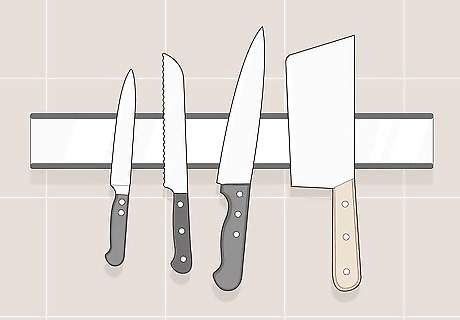
Hang the knives from a magnetic strip or push them into a knife block. To prevent accidental cuts, don't leave knives lying on the counter or store them in a drawer. Instead, hang them on a magnetized strip on the wall or stick them into a block on the counter. If your only storage option is a drawer, slide plastic knife guards onto the blades before you put your knives away. Put them in a drawer with other sharp items like scissors or vegetable peelers—this way, you're aware of where all the sharp items are.
Mop up spills and keep your floor clear.
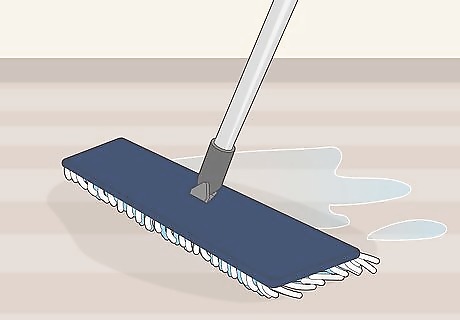
Wipe up spills and get rid of tripping hazards in your kitchen. It's really easy to slip if there's something wet on the floor and you haven't gotten around to cleaning it up. Keep a mop handy or use a cloth to soak up spills. Leave your kitchen floor open and accessible so you can move around safely and easily. If you've got a small kitchen it can be tempting to store things on the floor, but these are tripping hazards.
Keep a small fire extinguisher in your kitchen.
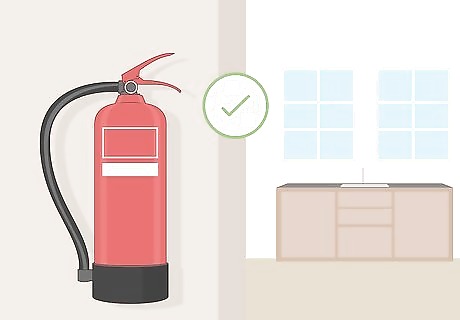
Put out cooking fires before they have a chance to spread. Kitchen fires are often responsible for causing house fires so keep a 5 lb (2.3 kg) fire extinguisher in an easy-to-reach spot or near a kitchen exit. This is especially important if you frequently deep-fry food. Don't have a fire extinguisher yet? In the meantime, you can put out kitchen grease fires by covering the container with a metal lid. This starves the fire of oxygen so it goes out. Don't pour water on the grease fire or you could make it flare up or spread. Always have a first aid kit near your kitchen with burn cream. This is helpful for relieving pain from minor burns like when you accidentally touch a hot pan.
Cook meat to a food-safe temperature.
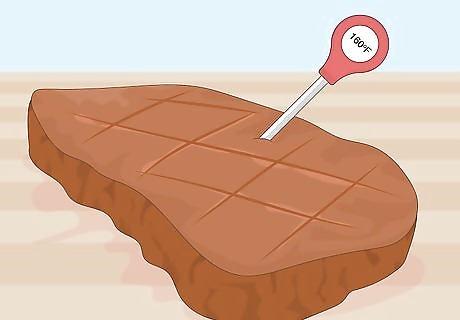
Get an instant-read thermometer to be sure. While it might be tempting to eyeball if your steak or burgers are done, it's best to check the meat's temperature with a thermometer so you know harmful bacteria are destroyed. Cook poultry to 165 °F (74 °C) and ground meat, pork, or beef cuts to 160 °F (71 °C). If you need to defrost food, your best bet is to put it in the fridge overnight. This helps the food thaw out, but if you're in a hurry, you could also submerge the frozen food in cold water. Just change out the water every 30 minutes until the food is defrosted. Cook raw eggs completely, too! Although you might see recipes for raw or lightly cooked eggs, skip these since salmonella is a risk.




















Comments
0 comment